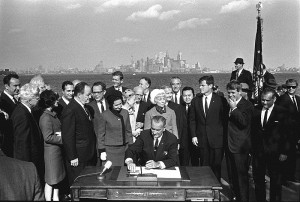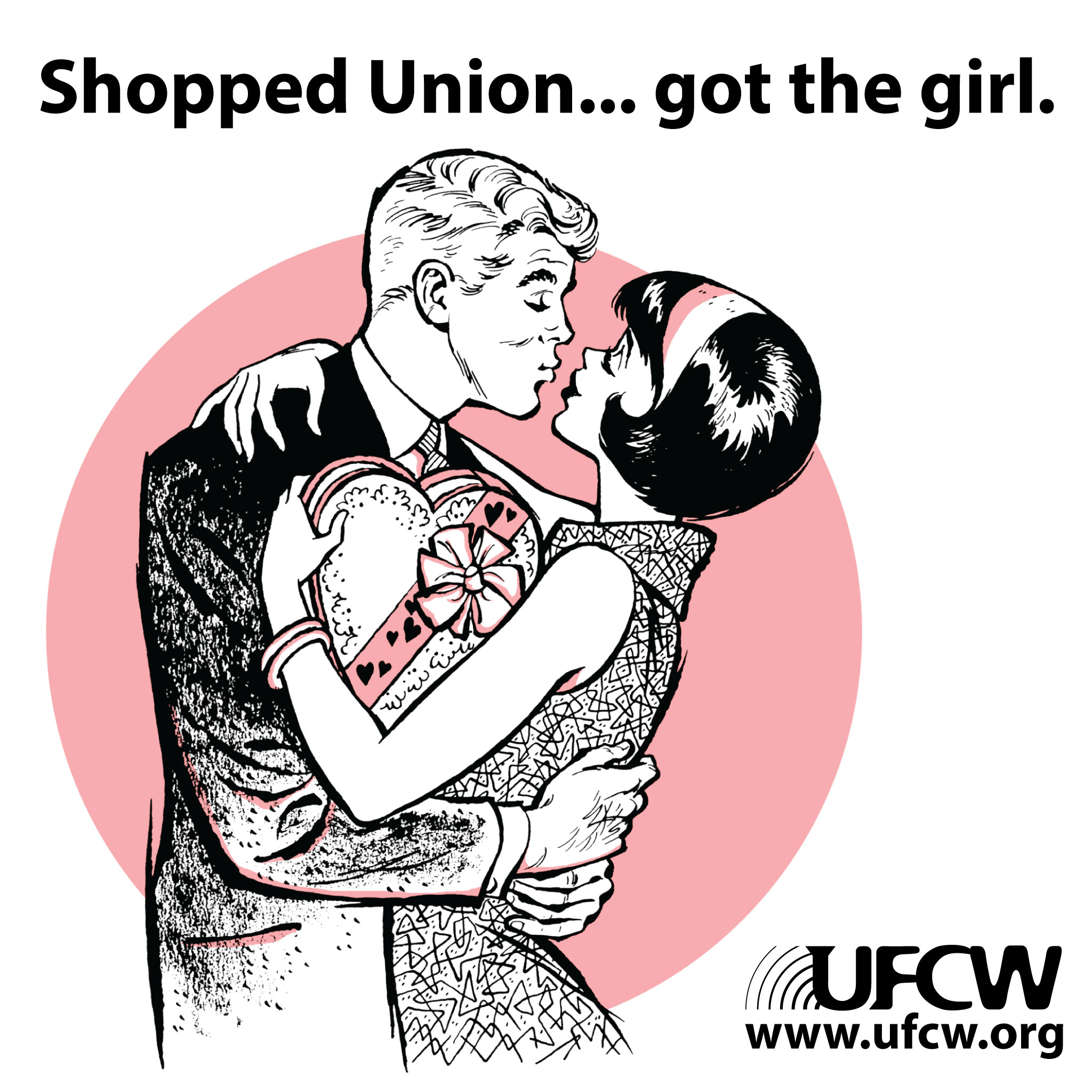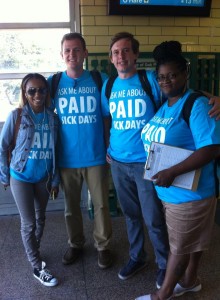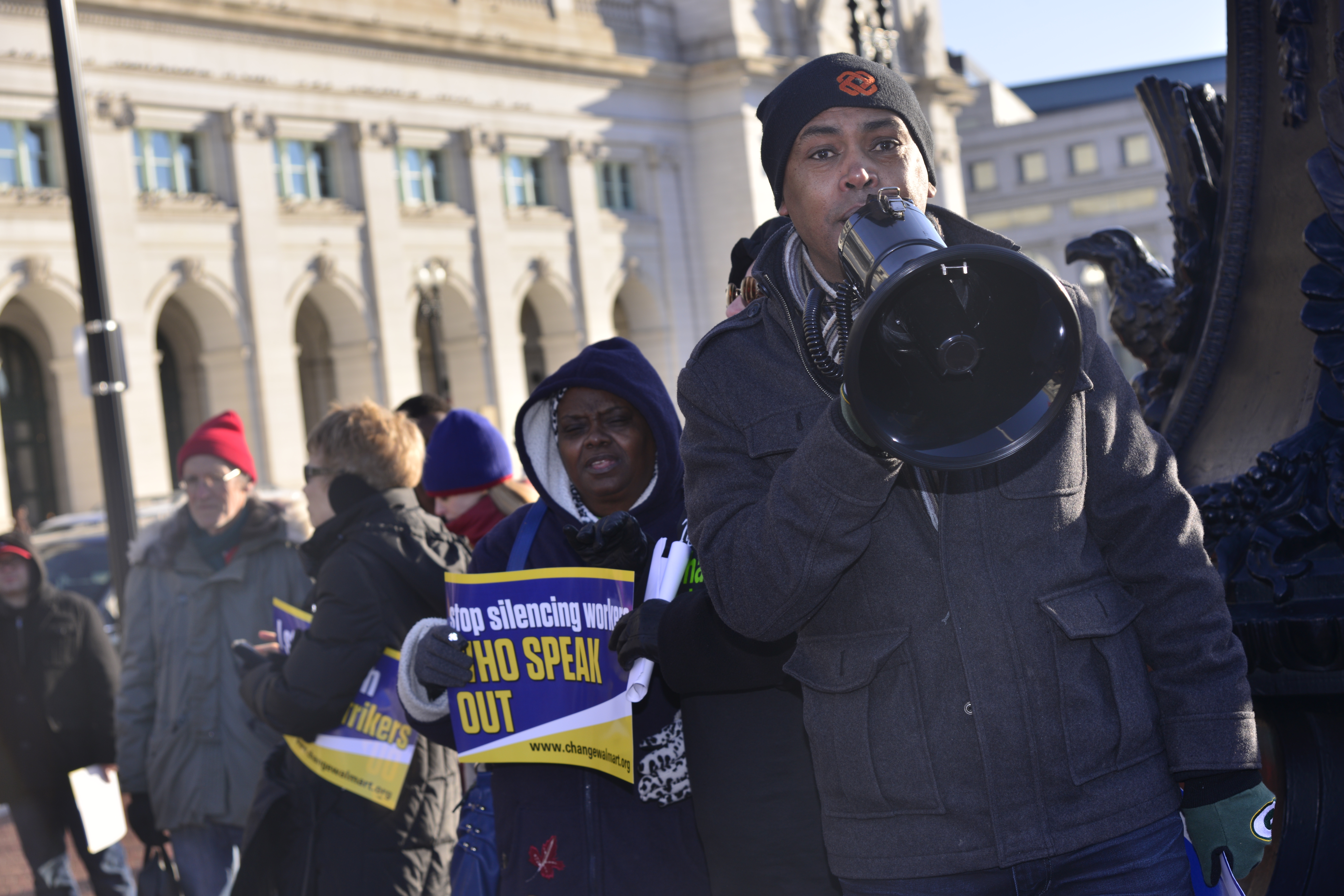February 25, 2015
After Successful First Year, UFCW GOLD Program Gears Up for 2015
In June 2014, the UFCW accepted 36 promising young members from across the country into the first-ever session of the UFCW GOLD Internship program, which launched in Chicago.
Now, after a wildly successful first year, the GOLD program is preparing for its 2015 session. The UFCW GOLD Internship Program provides growth opportunities for learning and development in order to raise up future union leaders and activists.
The 2015 program will select 36 rank-and-file members in the United States to participate in a seven-week program. The program will run from June 21 – August 5, 2015. Interns are required to participate in the entire length of the program. All interns should have a valid driver’s license and be flexible with travel outside of their home area.
During the program, there will be a four-week action project that interns will be individually assigned. Action projects will be assigned within one of five areas: Legislative and Political Action; Organizing; Collective Bargaining; Civil Rights; and Health and Safety. Last year’s action projects included working on a earned sick leave ordinance in the city of Chicago; working on a Retail Bill of Rights in San Francisco; participating in the Summer for Respect alongside Walmart workers fighting for justice on the job; and many other important projects relating to the welfare of working people.
You can learn much more about the upcoming session, and what previous GOLD participants learned from their experiences by visiting the updated website: http://gold.ufcw.org/.
Be sure to also check out the video recap of the 2014 session, where participants share their experiences and talk about what service projects they worked on.
“Getting the chance to come out to Chicago, meeting different people from different locals—it’s been an eye opener,” said 2014 UFCW Local 21 participant Bruce Le.
Fellow participant Samantha Christian also noted that after completing the program she felt like “we are all related—we are all brothers and sisters. I’ve never been as comfortable with people as I have been with the people I met here.”
Melissa Berry said she applied to become a GOLD participant because she felt that “a lot of people don’t know the role of their union, or what part they can play in it. I was eager to meet new people and learn about how we can spread the message.”
Tracy Officer, who worked on a service project in the Seattle area, said that “this internship builds us up—it gives us the knowledge to go back to our locals and give them the inspiration to say, ‘We are one. If you have an issue, we are fighting it together, and you don’t have to do it alone.’ I’ve been in the union for almost twelve years and I didn’t know that until this program.”
The deadline to apply to the 2015 session is April 1, 2015. You can find both the English and Spanish applications at http://gold.ufcw.org/application/.
February 23, 2015
UFCW International President Elected to AFL-CIO Executive Council, Executive Committee
 WASHINGTON, D.C.—Marc Perrone, International President of the United Food and Commercial Workers International Union (UFCW), today was elected to the AFL-CIO Executive Council and Executive Committee. He released the following statement.
WASHINGTON, D.C.—Marc Perrone, International President of the United Food and Commercial Workers International Union (UFCW), today was elected to the AFL-CIO Executive Council and Executive Committee. He released the following statement.
I am honored and humbled to represent the 1.3 million members of the UFCW on the Executive Council and Executive Committee of the AFL-CIO. As a labor movement, we have enormous challenges ahead of us. Workers are counting on us to organize more members, bargain good contracts, and defeat the corporations and politicians who are trying to silence their voice. I intend to play an active role in putting our movement in the best position to meet the needs of working families. We have to be more strategic. We have to communicate with our own members and non-union workers better. We have to become more diverse and immerse ourselves in the communities where our members live and work. Working with President Trumka and my colleagues from all of the AFL-CIO affiliates, I believe we can build a labor movement that is bigger, stronger, and more ready than ever to truly serve working men and women.
February 20, 2015
Statement by UFCW International President Marc Perrone on Walmart’s Wage Announcement
 (WASHINGTON, D.C.) – Marc Perrone, International President of the United Food and Commercial Workers International Union (UFCW), today released the following statement about Walmart’s wage announcement:
(WASHINGTON, D.C.) – Marc Perrone, International President of the United Food and Commercial Workers International Union (UFCW), today released the following statement about Walmart’s wage announcement:
“Walmart’s announcement yesterday that it will raise wages for 500,000 hourly associates is an important step forward for Walmart workers and their families. This is not an act of corporate benevolence. It would not have been possible without the courage of countless workers who are standing together, taking risks, and demanding wages and schedules that can support their families. Walmart is responding directly to calls from workers and their allies to pay a living wage.
Because of a strong and organized movement that includes many UFCW members, half a million Walmart workers will now get a raise. Because workers spoke out, $1 billion will now go directly into our economy instead of onto the Walton family’s balance sheet.
Walmart should know that we will continue to stand with workers and the community to be more transparent about exactly how much the company pays each of its 1.4 million associates. Today’s announcement calls to question Walmart’s long-term inconsistencies about its wage claims – even ten years ago it claimed workers were paid an average of $10 an hour. High turnover leaves the vast majority of Walmart workers toiling at the lowest wage scales which will now pay at least $9 an hour. We know that Walmart can and should do better.
Yesterday marks a victory for Walmart workers but more importantly, a call to action for the UFCW and the entire labor movement. The largest private employer in the nation is feeling the pressure to do better for its workers. We must seize this opportunity and keep fighting until every single worker – in retail stores, supermarkets and beyond – is paid a living wage.”
###
The United Food and Commercial Workers International Union (UFCW) represents more than 1.3 million workers, primarily in the retail and meatpacking, food processing and poultry industries. The UFCW protects the rights of workers and strengthens America’s middle class by fighting for health care reform, living wages, retirement security, safe working conditions and the right to unionize so that working men and women and their families can realize the American Dream. For more information about the UFCW’s effort to protect workers’ rights and strengthen America’s middle class, visit www.ufcw.org, or join our online community at www.facebook.com/UFCWinternationaland www.twitter.com/ufcw.
February 19, 2015
UFCW Members Celebrate Defeated Kentucky Right to Work Legislation
Last week, in front of a standing room only crowd filled with UFCW members in gold, a Kentucky House committee defeated right to work legislation. A great deal of work from UFCW members in Kentucky went into this victory.
For weeks, UFCW members have traveled to Frankfort to speak with their legislators and educate them about the pain a right to work law would bring to working families in Kentucky. Just before the right to work measure failed, Caitlin Lally from UFCW Local 227 gave an impactful testimony to the committee.
“There are hundreds of thousands of workers all across Kentucky looking to this committee to do the right thing,” said Lally. “Let’s pursue an agenda to make Kentucky stronger. Let’s continue to build a state where businesses grow, workers succeed, and families thrive. Let’s resist the influence of outsiders and come together in the proudest traditions of our state. Let’s defeat right to work.”
With right to work laws currently being proposed in numerous state legislatures, this victory in Kentucky should not go unnoticed. Workers need more money in their pockets, but people in right to work states earn $5,000 less per year. Workers want to send their children to successful schools, but right to work states spend 31.3 percent less per pupil on education. Workers deserve to feel safe at work, but right to work states have a workplace death rate that is over 54 percent higher.
This win in Kentucky shows that workers who stick together, whether it’s inside their workplace or the State Capitol, can shape a better future for themselves and their families.
February 19, 2015
UFCW Local 1564 Members Fight to Defeat Right to Work in New Mexico
On February 12, nearly 100 members of UFCW Local 1564 traveled to the New Mexico State Capitol in Santa Fe to lobby their legislators against right to work legislation. During meetings with key senators, UFCW members made the case that right to work would have a severely negative impact on New Mexico.
“Right to work would allow companies to lower wages,” said UFCW Local 1564 member Andre Leger, who works at Smith’s. “It’s an attack on workers who are already struggling to make ends meet.”
Annette and Mark Ayers, along with their adult daughter, all work at Smith’s and are all members of UFCW Local 1564. “Workers need to have a say in their own future,” Mark said. “That is why we are here.” “We work at a lower rate than the rest of the country and right to work would make wages even lower,” said Annette. “Our state simply cannot afford that.” Annette added: “We have a single daughter who works for Smith’s. She’s able to pay for her own apartment, afford a car, and get the basics in life. If right to work passed, she’d be living in our house.”
Several members talked about the importance of the UFCW being represented in the halls of the Captiol. “If you don’t say anything about how you feel, you almost always lose,” said UFCW Local 1564 member Alek Dewispeleare, who works at Smith’s. Fellow UFCW Local 1564 member and Smith’s worker Mark Sokolowski agreed: “I’ve been a union member for over 30 years,” he said. “No one forced me to join. I’ve been able to support my family. I won’t stand by and let career politicians take that away.”
Annette Ayers talked about the emotion of the Lobby Day. “When my senator told me he was against right to work, my eyes filled with tears,” she said. “It gives you hope that there are people truly working for you.”
February 17, 2015
Black History Month: 50th Anniversary of the Immigration and Nationality Act
Fifty years ago at the height of the civil rights movement, our country’s immigration policy was radically changed. The Immigration and Nationality Act, also known as th e Hart-Celler Act, abolished the national origins quota system which favored some Europeans and excluded Asians and Africans and established a new immigration system that focused on attracting skilled labor to the United States and reuniting immigrants with their families.
e Hart-Celler Act, abolished the national origins quota system which favored some Europeans and excluded Asians and Africans and established a new immigration system that focused on attracting skilled labor to the United States and reuniting immigrants with their families.
The 1965 law, which opened the door to immigrants from Asia, Africa and Latin America and changed the demographic makeup of our country, was signed by President Johnson at the foot of the Statue of Liberty on October 3, 1965. An excerpt from President Johnson’s speech is as follows:
This bill says simply that from this day forth those wishing to immigrate to America shall be admitted on the basis of their skills and their close relationship to those already here.
This is a simple test, and it is a fair test. Those who can contribute most to this country–to its growth, to its strength, to its spirit–will be the first that are admitted to this land.
The fairness of this standard is so self-evident that we may well wonder that it has not always been applied. Yet the fact is that for over four decades the immigration policy of the United States has been twisted and has been distorted by the harsh injustice of the national origins quota system.
Under that system the ability of new immigrants to come to America depended upon the country of their birth. Only 3 countries were allowed to supply 70 percent of all the immigrants.
Families were kept apart because a husband or a wife or a child had been born in the wrong place.
Men of needed skill and talent were denied entrance because they came from southern or eastern Europe or from one of the developing continents.
This system violated the basic principle of American democracy–the principle that values and rewards each man on the basis of his merit as a man.
It has been un-American in the highest sense, because it has been untrue to the faith that brought thousands to these shores even before we were a country.
Today, with my signature, this system is abolished.
Today, the fight to create a fair and just immigration policy and make our country a more open place continues. It’s time to reform our country’s immigration system and create a clear and fair path to citizenship for aspiring Americans so that they can live and work without fear.
February 12, 2015
Healthy Families Act Reintroduced
Today Senator Patty Murray and Congresswoman Rosa DeLauro reintroduced the Healthy Families Act, federal legislation that would allow workers to earn up to seven paid sick days.
Twenty jurisdictions nationwide—three states and 17 cities—have adopted paid sick laws. That’s a four-fold increase since the Healthy Families Act was last introduced in March 2013.
However, despite this substantial progress, nearly 43 million workers still don’t have access to paid sick days and more than one-third of U.S. states have never passed a single law recognizing the dual demands of work and family.
The UFCW strongly supports passage of the Healthy Families Act.
February 11, 2015
UFCW Local 1564 Members Speak Out Against RTW in New Mexico
Click here to watch a video of UFCW Local 1564 members speaking out against right to work in New Mexico.
February 11, 2015
AFL-CIO Executive Vice President Tefere Gebre Honors the African-American Labor Leaders Who Have Inspired Him in His Work
Reposted from Huffington Post
By Tefere Gebre:
Every February, people across the country celebrate Black History Month. We honor the heritage and struggle of African-Americans in the United States while looking with hope towards the future. This year, I am honored to look back at organizers and activists who inspire me daily in my work as a leader in the labor movement. The history of the modern labor movement, which is positioned to speak, fight, and win on behalf of all workers, is filled with strong black figures who fought for civil and economic justice during a time when justice was not guaranteed for all.
When I arrived in the United States at the age of 15 as a refugee of war-torn Ethiopia, I struggled to take care of myself financially while also trying to focus on my academics. When I started college at Cal Poly Pomona on an athletic scholarship, I also got a job as a night shift loader for UPS as a member of Teamsters Local 396. UPS was my first union job and it opened my eyes to the world of labor and all of the trailblazing African-American organizers who had come before me.
People like Bayard Rustin who persevered in the face of threats and violence in his efforts to organize workers on behalf of the trade unionists. Despite enduring multiple arrests and beatings, Rustin continued in his work and went on to help organize the March on Washington for Jobs and Freedom alongside A. Philip Randolph, another great African-American labor leader. The March on Washington was the largest demonstration the United States had ever seen, bringing together hundreds of people in the struggle for better jobs and better lives.
Thanks to the work of activists like Rustin and Randolph, all African-Americans have moved closer to achieving the goals of justice and equality set forth by the civil rights movement. Rustin and Randolph are important examples of the positive role unions and collective action play in the African-American struggle for economic justice. Today, African-American union members earn 28 percent more than our non-union peers and are far more likely to have good benefits that help us raise families. But there is still work to be done.
Now more than ever, the struggle for civil rights must include good jobs that raise wages and an economy that works for all. Without good jobs, there is no real freedom. While African-American union members are weathering the economic downturn with the aid of collective bargaining, our non-union brothers and sisters are suffering. Today African-Americans have a 10.4 percent rate of unemployment in the United States compared to a 4.8 percent rate for white Americans.
It’s time for the next generation of leaders to take up the torch and work on behalf of all workers. I am grateful for the inspiration that past African-American leaders have left behind for me. This proud legacy continues to motivate fellow activists who are fighting for justice today. Let’s get to work and make them proud.
February 10, 2015
Show Your Fellow Union Members Some Love By Having a Union-Made Valentine’s Day
 Whether you want to give your special valentine a sweet treat, find a great Valentine’s day gift for your best friend, or even satisfy your own sweet tooth this Valentine’s Day, show the hardworking men and women of the UFCW some love and support by shopping for union-made goods, or purchasing items from your favorite local union shop. We’ve provided a list of UFCW-made items below to make buying something for your sweetheart easy! You can also save 25% on Teleflora flowers and gift baskets when you use your Union Plus discount.
Whether you want to give your special valentine a sweet treat, find a great Valentine’s day gift for your best friend, or even satisfy your own sweet tooth this Valentine’s Day, show the hardworking men and women of the UFCW some love and support by shopping for union-made goods, or purchasing items from your favorite local union shop. We’ve provided a list of UFCW-made items below to make buying something for your sweetheart easy! You can also save 25% on Teleflora flowers and gift baskets when you use your Union Plus discount.
Chocolate:
- Ghirardelli chocolates
- Baby Ruth bars
- Hershey’s
- KitKats
Candy:
- Smarties
Beverages:
- Andre champagne
- Arbor Mist
- C.K Mondavi Pinot Grigio
- Turning Leaf Chardonnay







